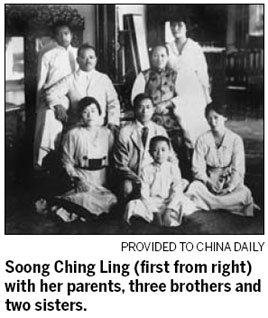People
The ties that bind and cut
Updated: 2011-05-09 07:55
By Lin Qi (China Daily)
Though she had different political views from her brothers and sisters, Soong Ching Ling always had warm feelings for her family and this fact may be attributed to their early years together.
"After supper they would get together while the father played the trumpet or sang rustic songs he had learnt in the United States. The mother played the piano. The children learnt to sing songs such as, How Lovely is My Family," said Chen Hongjun, deputy director of the China Soong Ching Ling Foundation research center.
Ching Ling and Soong Mei-ling were on especially good terms. They became inseparable playmates after the older sister, Soong Ai-ling, went to the US in 1904. The two often sneaked out of their house, a villa with a garden in Shanghai's Hongkou, and played together outside.
Together, they arrived in the US in 1907. For three years after Ai-Ling graduated and returned to China, Ching Ling shouldered the responsibility of taking care of Mei-Ling, four years her junior.
After she became Sun's secretary, Ching Ling confided to her younger sister, who was still in the US, her admiration for Sun. Mei-ling was the only one in the family who supported her sister's decision to marry Sun.
When Ching Ling stayed in Guangzhou with Sun in the early 1920s, Mei-ling often visited her sister's home, where Ching Ling had prepared a comfortable bedroom for her.
 |
A crack in their sisterly feelings appeared when Mei-ling married Chiang Kai-shek, who Ching Ling believed betrayed Sun's revolutionary ideas. The political divide estranged the two sisters until the 1936 Xi'an Incident, when Ching Ling did a lot of liaison work for a peaceful settlement, which comforted Mei-ling.
During World War II, the three sisters appeared together on the streets of Chongqing, which caused a sensation and inspired people. For seven weeks in 1940, the Soong sisters raised money, took care of wounded soldiers and called for people to fight against the invaders.
Ching Ling said: "My three brothers are in Washington collecting war supplies. Our whole family is working together for the war against fascism."
In 1947, Ching Ling received a letter from Mei-ling, who said "Thank you for the delicious lake shrimps. I have two cans of food for you, one is a can of ginger cakes and the other is a can of cheese crackers".
But the younger sister wasn't able to give her present because the ongoing War of Liberation cast more shadows on their relationship. Ai-ling moved to the US later that year and then Mei-ling left the mainland, which meant the family never reunited.
"In her later years, Soong Ching Ling missed her sister. She asked her friends in the US to express her wish to see Mei-ling and said that she hoped her sister would return to her homeland. But her wishes were not fulfilled," Chen said.
"She often looked at her family albums, which had photos of her brothers and sisters and played on the piano old songs that were loved by the whole family."
Ching Ling's ashes were buried in the Soong family graveyard at Shanghai Wanguo Cemetery, now the Soong Ching Ling Mausoleum.
Her mother Kwei Twang Nyi once said, "No matter how my children get on during their lifetimes, the whole family must come together after their deaths."
However, just the parents and their second daughter, are in the family graveyard.
China Daily
Specials

2011 Sino-US Dialogue
China and the United States will hold the third round of the Strategic and Economic Dialogue from May 9-10 in Washington.

Bin Laden dead
The world's most wanted man was killed in a US raid in Pakistan.

US-style sports camp
The US sports camp company, Camp Woodward, will open its first residential camp in Beijing in June.